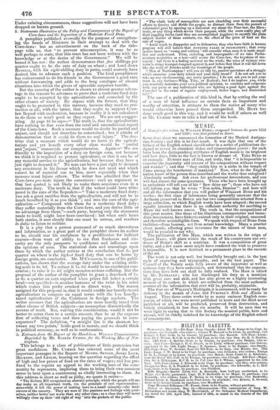MUSIC.
A Mass pr fice roices, by WILLIAM BYRD ; composed between the years 1553 and 1558 ; now first printed in Score.
SOME time since we announced the formation of the Musical Antiqua- rian Society ; and this is its first result. It was right that one of the fathers of the English school should usher in a series of publications de- signed to reveal its abundant riches and transcendant power : for such have been the distinguishing attributes of English music in its brightest and best days, little as the fact is known or dreamt of. Take BYRD as an example. BUP.NEY says of him, and truly, that " it is impossible to examine the ingenuity and texture of his compositions without respect and wonder" ; and that " they entitle him to a niche in the temple of Fame among the benefactors of mankind." Now, what do the English nation know of the person thus described and the works thus eulogized? Absolutely nothing. Ask even his professional descendants, and you will find almost the same ignorance. Those who have been brought up in cathedrals will tell you of his " Bow thine ear "; those who have not will inform you that be wrote "Non nobis, Domine": and here will end all the information that you will gather of WiLuear Bran and his works ; the first class of informants being generally unaware that the Anthems preserved in BOYCE are but two compositions selected from a large collection, to which English words have been adapted; the second- equally ignorant that there is no sufficient authority for ascribing to Bra]) the well-known canon. The truth is, that the compositions of this great master, like those of his illustrious cotemporaries and imme- diate descendants, have hitherto existed only in their original, unscored and therefore unintelligible form. We speak with respect of Bran from tradition—from hearsay, not from actual knowledge. Many a prattler about music, affecting great reverence for the talents of those men, would be puzzled to say why.
The publication of this Mass, which was written in the reign of
Queen MARY, will place within the reach of his countrymen one evi- dence of BYRD'S skill as a musician. It was a composition of great rarity, and a few years more might have rendered the wish to preserve it impossible. It is now destined to a permanent place in the records of the art.
The work is not only well, but beautifully brought out ; in the best
style of engraving and typography, and on the best paper. The Council of the Society seem fully aware of the important as well as arduous duty they have undertaken, and determined that the expecta- tions they have held out shall be fully realized. The Mass is edited by Mr. RIMS.% ULT ; who has discharged his duty as a musician with great care and skill, and has also given us a highly interesting memoir of its author, in which are collected from the most authentic sources all the information that ever will be, probably, attainable.
The first set of WILBYE'S Madrigals, it is announced, will be ready for
delivery in the month of June, and PURCELL'S Dido and Eneas in August. Thus three entire works by as many eminent English com- posers, of which two were never published in score and the third never published at all, will be produced, preserved from destruction, and widely circulated, in less than six months. It will be seen that we were right in saying that to this Society the musical public, here and abroad, will be chiefly indebted for its knowledge of the English school of counterpoint.


























 Previous page
Previous page